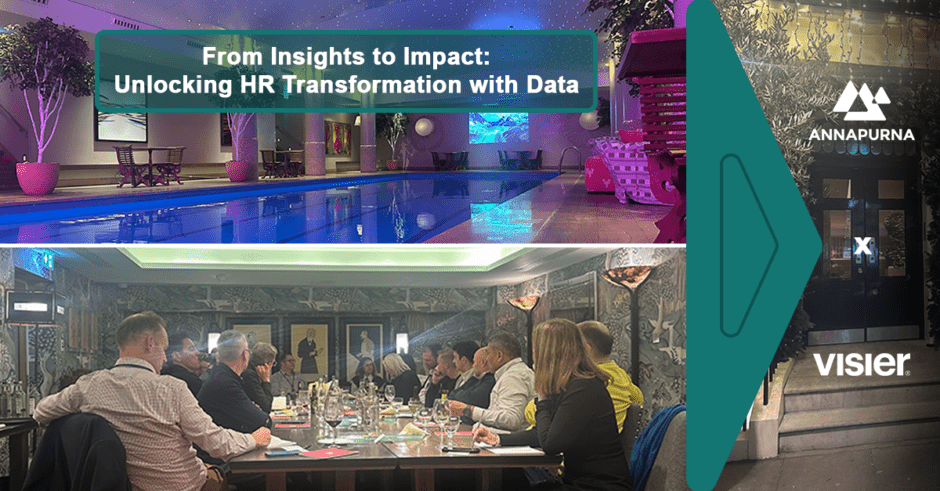The return is only as good as what you put into it.
There are many commonalities that are affecting organisations in the current world of work, with a key one being adapting to the ever-evolving role of technology and bringing your people on that same journey.
We were delighted to recently host a roundtable with Visier, the leading People Analytics and Workforce Planning platform, for a fascinating discussion about ensuring our HR transformation projects land efficiently through the effective use of data.
Hosted by Joseph Nabarro (Associate Director at Annapurna) with expert insights from Ben Harris (VP, EMEA at Visier) and Daniel Cundill (Account Executive at Visier), the conversation covered a variety of topics across the HR ecosystem and brought about the following key takeaways:
Ownership and Collaboration are Key to Data-Driven HR Strategies
Effective HR strategies depend on clear ownership of both data and processes. A topic of conversation at the table focused on the discrepancies between owning the data and owning the process of data-driven HR strategies. Organisations produce a lot of data daily, our People Analytics teams can access these at the click of a button but what do you now do with it? What do you ‘want’ to be doing with this data?
Collaboration between HR and Finance is crucial for success, as cohesive reporting builds credibility and alignment. Scenario planning, backed by qualitative and quantitative analysis, helps create agile strategies for scaling up or down whilst continuing to align workforce needs with organisational goals.
The concept of reskilling and upskilling is a positive area of conversation across organisations. If we can use the data to build taxonomies that allow us to plan for anything, whether that be rapid growth, steady growth, continued operations or contingency-based team consolidation, HR can secure its seat at the table with the CEO alongside Finance.
Strategic Workforce Planning (SWP) must Align with Business Goals
Many organisations struggle to articulate future needs and align them with actionable SWP. What does SWP even mean for your business?
Business goals need to be defined in terms of where they want to be and the achievable timeframe. Business leaders like to speak about the future and a vision but can’t necessarily always articulate what this means for individuals or teams.
A credible and integrated SWP framework enables HR to become an ally in creating actionable insights and facilitating strategic conversations. Data must become the drive for your decision making but is HR understanding the data and driving this through to be part of SWP? To succeed, HR teams must develop capabilities to interpret and utilise data effectively, ensuring alignment with business strategies.
Can you work on insights too early in the process? We must be building a business strategy first, using the data and then bringing the SWP team in to manipulate accordingly.
The bigger you make your SWP, the less you’re going to achieve. There was an open discussion about the level of planning and re-planning that goes into SWP specifically. You must always be building, integrating and maintaining confidence around your SWP. The role of the People Analytics leaders is there to help the leadership team. As HR, the data must be understood to ensure credible conversations can be had at all stages in the process.
Balance Innovation with Ethics
AI and automation present transformative opportunities for HR but require a structured approach to data use.
There is a lot of noise across industry but a significant lag of pragmatic examples. AI will undoubtedly cause massive disruptions in the world of work and the shape of the workforce but we must ask what we want from AI in the workplace
HR professionals must focus on using AI to enhance decision-making, enabling faster maturity of HR capabilities.
Across organisations, People Analytics must start to look at where AI could reap the benefits across their data infrastructure. Structured data can be managed and interpreted with the systems built for this purpose, whereas AI could potentially thrive with unstructured data by providing insights and recommendations.
Ethical considerations and the quality of inputs are critical to achieving meaningful outcomes, making it essential for HR teams to ask the right questions and anchor AI initiatives to organisational needs.
The return is only as good as what you’re trying to get out of it.
HR Transformations and specifically skills-based transformations are only successful when built upon the understanding of exactly what the business wants in the future. The skills and capabilities that we need across our organisations are potentially going to be far less technical in the future as roles will navigate into the storytelling of data and data-led decision-making. HR’s role is to come to the table and explain the next generation of working and HR itself.
Strategic Workforce Planning can open up an array of opportunities across the business but we must realise whether we even have an ecosystem to facilitate a SWP conversation and whether your HR team has the capabilities to understand the journey.
If you’re interested in discovering how to best utilise your HR data into actionable insights, please get in touch with Visier or consider joining their Outsmart Local LDN event which is focused on Owning your People Data Strategy.




